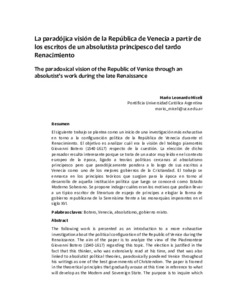Please use this identifier to cite or link to this item:
https://repositorio.uca.edu.ar/handle/123456789/7933| Título: | La paradójica visión de la República de Venecia a partir de los escritos de un absolutista principesco del tardo Renacimiento | Autor: | Miceli, Mario Leonardo | Palabras clave: | ABSOLUTISMO; RENACIMIENTO; Botero, Giovani, 1540-1617; CIENCIA POLITICA | Fecha de publicación: | 2015 | Editorial: | Universidad Nacional de Cuyo. Facultad de Filosofía y Letras. Asociación de Estudios Interdisciplinarios sobre Europa | Cita: | Miceli, M. L. La paradójica visión de la República de Venecia a partir de los escritos de un absolutista principesco del tardo Renacimiento [en línea]. Europa. 2015, 8. Disponible en: https://repositorio.uca.edu.ar/handle/123456789/7933 | Resumen: | Resumen: EI siguiente trabajo se plantea como un inicio de una investigación mas exhaustiva en torno a la configuración política de la República de Venecia durante el Renacimiento. El objetivo es analizar cuál era la visión del teólogo piamontés Giovanni Botero (1540·1617) respecto de la cuestión. La elección de dicho pensador resulta interesante porque se trata de un autor muy leído en el contexto europeo de la epoca, ligado a teorlas politicas cercanas al absolutismo principesco pero que paradójicamente pondera a lo largo de sus escritos a Venecia como uno de los mejores gobiernos de la Cristiandad. EI trabajo se enmarca en los principios teóricos que surgían para la época en torno al desarrollo de aquella institución política que luego se conocerá como Estado Moderno Soberano. Se propone indagar cuáles eran los motivos que podian llevar a un típico escritor de literatura de espejo de principes a elogiar la forma de gobierno republicana de la Serenísima frente a las monarquías imperantes en el siglo XVI Abstract: The following work is presented as an introduction to a more exhaustive investigation about the political configuration of the Republic of Venice during the Renaissance. The aim of the paper is to analyze the view of the Piadmontese Giovanni Botero (1540-1617) regarding this topic. The election is justified in the fact that this thinker, who was extensively read at his time, and that was also linked to absolutist political theories, paradoxically pondered Venice throughout his writings as one of the best governments of Christendom. The paper is framed in the theoretical principles that gradually arouse at this time in reference to what will develop as the Modern and Sovereign State. The purpose is to inquire which were the reasons that could have lead a classical writer of mirror of princes to praise the republican form of government of the Serenissima in front of the majority of monarchies which ruled during the sixteenth century |
Cobertura Espacial: | VENECIA SIGLO XVI |
URI: | https://repositorio.uca.edu.ar/handle/123456789/7933 | ISSN: | 1515-6133 | Disciplina: | CIENCIA POLITICA | Derechos: | Acceso Abierto | Fuente: | Europa Nº 8, 2015 |
| Appears in Collections: | Artículos |
Files in This Item:
| File | Description | Size | Format | |
|---|---|---|---|---|
| paradojica-vision-venecia-renacimiento.pdf | 182,35 kB | Adobe PDF |  View/Open |
Page view(s)
282
checked on Apr 30, 2024
Download(s)
354
checked on Apr 30, 2024
Google ScholarTM
Check
This item is licensed under a Creative Commons License

